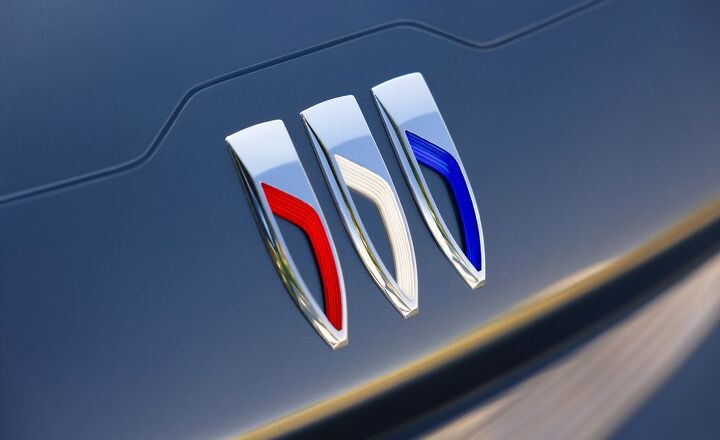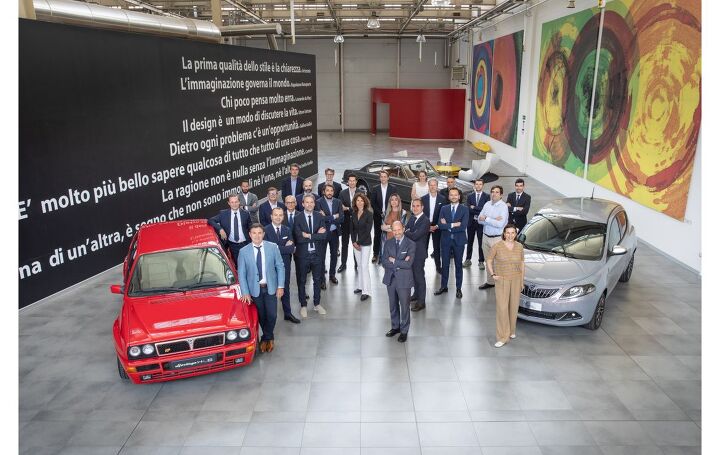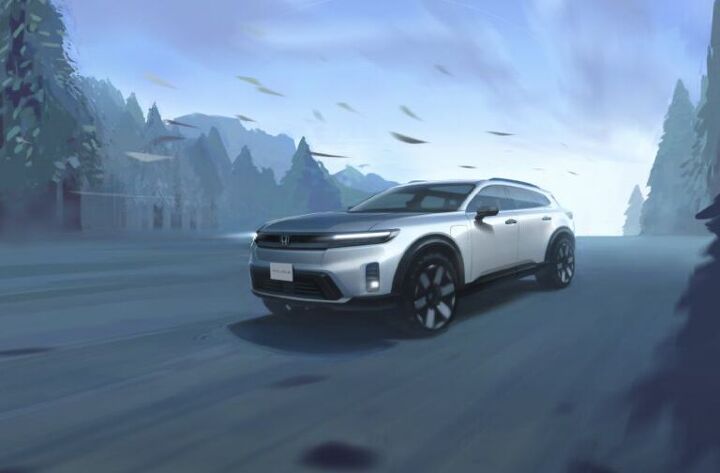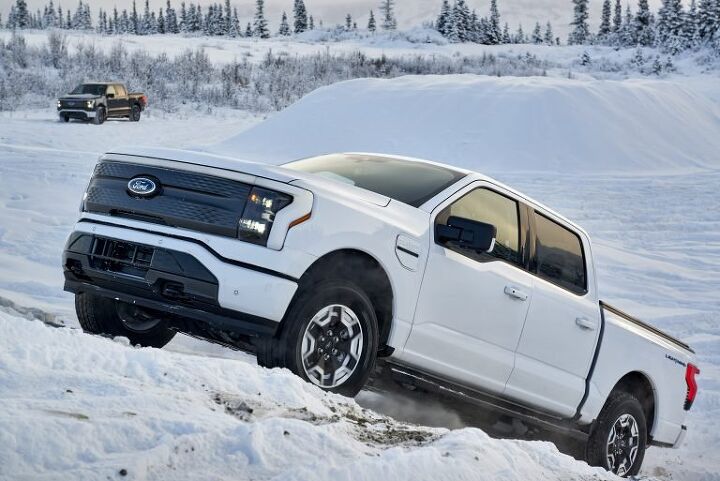#EVs
Ferrari Says Majority of Sales Will Be EVs, Hybrids by 2030
Last week, news broke that Ferrari was plotting a third assembly line in Maranello dedicated entirely to EV production. But this turned out to be little more than a preamble for the obligatory announcement that the company would eventually transition toward building electric vehicles.
On Thursday, the Italian automaker told investors that all-electric and hybrid models will make up 80 percent of its global sales volume by 2030. This is to be done via a slew of new products it hopes to launch between now and 2026. Though the first Ferrari to run exclusively on battery power isn’t scheduled to arrive until 2025. According to the manufacturer, it’s plotting to launch 15 new vehicles as part of the overarching strategy. While some of those will undoubtedly be duplicates boasting open-air cockpits and slightly different powertrains, it has still got to be some kind of record for the brand.
Cadillac EVs May Be Bound for Europe
In 2017, General Motors bowed out of the European market. The tactical retreat came after nearly two decades of struggling to make the region profitable and freed up cash the company could use to expand more profitable endeavors located elsewhere. This basically entailed widening its footprint in China, eliminating modestly sized passenger vehicles from its North American lineup, and setting aside any extra money for electric vehicle development. However, the automaker’s Western clientele has been slower to embrace EVs than hoped, even with gas prices becoming astonishingly high, and market analysts expect the United States to be the very last developed nation to see alternative powertrains go mainstream.
One possible solution for this conundrum is to sell those all-electric vehicles elsewhere — namely Europe.
Ford Recalling 'Mustang' Mach-E Over Battery Issues
On Monday, Ford Motor Co. notified dealers that it would be issuing a stop-sale notice for the all-electric “Mustang” Mach-E. The note made mention that the high-voltage contacts on the battery could overheat and cause malfunctions — potentially causing the vehicle to lose power while in operation or even fail to start.
Considering how absolutely wicked battery fires can become, this was likely a prudent move on the part of Ford. Over the last several years, EVs have been getting some negative attention for fires related to charging or battery failures of late and Blue Oval is likely aware that any mishaps with the Mach-E will be amplified as a result. Nipping this in the bud immediately is wise. However, the resulting recall has defaulted to the industry standard solution of issuing a software update on the affected models.
Gas War: Automakers Continue Begging Government for EV Incentives
On Monday, General Motors, Ford, Stellantis, and Toyota Motor North America reportedly asked the United States Congress to lift the existing cap on the $7,500 federal tax credit for electric vehicles. Though automakers petitioning the government for free money is hardly new business.
Report: Ferrari Plotting Italian EV Assembly Line
Ferrari is rumored to be preparing a third assembly line in Maranello, Italy, dedicated for electric vehicles. The automaker has already purchased land near the facility and is presumed to make an official announcement on June 16th when it’s scheduled to present its four-year business plan.
As usual, this comes from a major media outlet that cited unnamed sources from within the industry. Though, considering the luxury sports car manufacturer’s confirmation that it would begin producing hybrid and all-electric automobiles, it’s more than plausible. Ferrari’s first battery electric vehicles are scheduled to arrive in 2025 and it still needs somewhere to build them.
Biden Admin Proposes Minimum Standards for EV Charging
With the Biden administration hoping to transition the United States toward all-electric vehicles, it has set a goal of commissioning the construction of a nationwide network of 500,000 EV charging stations by 2030. But saying you’re going to do something as part of a $1-trillion infrastructure plan is a lot easier than actually doing it because there are a lot of steps that have to be taken before a plan can effectively be put into action. This is called planning and it’s something the government occasionally engages in to ensure a program is successful. As such, the Biden administration is issuing a series of standards and requirements for federally funded electric vehicle charging stations.
“To support the transition to electric vehicles, we must build a national charging network that makes finding a charge as easy as filling up at a gas station,” said U.S. Transportation Secretary Pete Buttigieg. “These new ground rules will help create a network of EV chargers across the country that are convenient, affordable, reliable and accessible for all Americans.”
Toyota Has Expansion Plans for bZ Family
Toyota plans on having seven models in its bZ family of EVs by 2025, according to Motor1. Scheduled to arrive in the late spring, the bZ4X crossover will be the first of those models, as you likely know. And there are more on the way.
Ford Decides Paying for Ads Is Stupid
Ford CEO Jim Farley has said he sees little reason for the automaker to bother using traditional advertising campaigns for electric vehicles. Considering how often I see the Ford logo grace whatever screen I happen to be peering into, this would seem to go against everything I’ve been conditioned to accept. However the company believes its EVs practically sell themselves already, with the executive noting that the Mach-E has been sold out for quite some time.
“I’m not convinced we need public advertising for [electric vehicles] if we do our job,” Farley said during Wednesday’s Bernstein Strategic Decisions Conference.
Buick Going EV Only After 2030, Gets New Logo
On Wednesday, Buick formally committed itself toward an “all-electric portfolio” by 2030 — saying that it would be embarking on a brand transformation that would fundamentally change the company forever. This includes an entirely new horizontally oriented badge that doesn’t stray too far from Buick’s traditional tri-shield design.
“The Buick brand is committed to an all-electric future by the end of this decade,” stated Duncan Aldred, global vice president, Buick and GMC. “Buick’s new logo, use of the Electra naming series and a new design look for our future products will transform the brand.”
Survey Suggests Americans Still Doubt EVs [UPDATED]
While plug-in vehicles are catching on in Europe, representing 21 percent of all new registrations in the first quarter of 2022, they’ve been less popular in the United States. Only about 5.2 percent of American registrations were of the plug-in variety (representing hybrid and purely electric vehicles) during the same timeframe. Despite the industry spending billions to develop and market these vehicles, with some progress being made, the overall take rate within North America remains underwhelming.
Ardent fans of battery based powertrains will undoubtedly disagree. But a couple of studies came out this month that drove the point home. Autolist’s Annual Electric Survey dropped earlier this month, effectively outlining why EVs haven’t been able to make more headway in the states.
Lancia Returns With 10-Year Restoration Plan
Stellantis has been discussing the prospect of reviving the Lancia brand for months, hinting that the returning Delta would even be part of the deal. While technically still active, the historic Italian company has devolved into a swath of rebadged Chrysler products and now produces the Ypsilon (based on the Fiat 500) as its singular offering in Europe.
However, some die-hard fans of the nameplate took umbrage with the matter after it was revealed that the Delta would be an all-electric vehicle in October of 2021. As time went on, the manufacturer vowed that the model would be a worthy successor to performance models like the HF Integrale. But continued insisting upon electrification being an essential component of Lancia’s revival and has formally introduced its overarching plan for the marque.
Electric Vehicle Registrations Surge Across the U.S.
Continuing a nationwide & industry trend towards more electric vehicles, more Americans are registering EVs.
2024 Honda Prologue Design Teased
Honda has begun teasing out the electric Prologue in earnest, with its latest offering being a sketch of what appears to be a lifted Civic. Though what we’re actually seeing is the brand’s newest “adventure-ready” SUV tapping into the same inoffensive design language that now graces the ever-popular sedan.
The styling is neutral, perhaps even a little dull. But it’s unlikely to put anybody in a bad mood and is still rounded off in all the places one would expect from an EV. The Prologue looks as though it could come from Lucid, just with a dash of rugged design from Rivian and underpinned by Honda’s current design language. There’s little to gripe about, though there’s also not much to ogle.
Opinion: These Brands Won't Make It in the US (as EVs)
Unless you’ve been living under a rock since 2019, you’ve probably realized that just about every major carmaker has plans to go “fully electric” at some point in the rapidly approaching future. That’s going to mean big changes in the way we buy and use cars, obviously— but change is hard, and not every company is going to be willing or able to make those changes.
That equally obvious fact begs the question: who’s not gonna make it?
Gas War: Republican States Sue EPA Over Californian Standards
Last week, a group of Republican attorneys general decided to sue the Environmental Protection Agency (EPA) over its decision to reinstate the waiver allowing California to set its own limitations on exhaust gasses and zero-emission vehicle mandates that would exceed federal standards.
The agency approved the waiver after it had been eliminated as part of the Trump administration’s fuel rollback on the grounds that it would create a schism within the industry by forcing automakers to produce vehicles that catered to the Californian market at the expense of products that might be appreciated in other parts of the country. However, Joe Biden’s EPA sees things differently and has aligned itself with the California Air Resources Board (CARB) in giving the state more leeway to govern itself in regard to emissions policing.





























Recent Comments